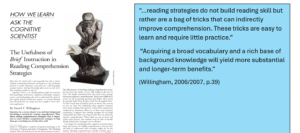Comprehension Strategies
https://education.ufl.edu/patterson/files/2020/10/Willingham-ComprehensionStrategies.pdf?fbclid=IwZXh0bgNhZW0CMTEAAR1yEU9bduLzKllw3SQd3qOQoZ_k18nPrpaLBpKymVmb4SCNRwnLkA_5NhA_aem_touoopaAvkXC7cPuC_HvdA
Read the following article by Daniel T Willingham (Cognitive Scientist) and then consider your approach to teaching reading comprehension strategies. Will you adjust your practice? Why
How We Learn – Ask the Cognitive Scientist
Commonly used strategies include
- Questioning
- Retelling
- Summarizing
- Predicting
- Monitoring understanding Comprehension monitoring – Five from Five
The Novice to Expert
Why Explicit Instruction?
Explicit instruction expert, Dr. Anita Archer provides the rationale and overview of explicit instruction and its benefit to students.
https://youtu.be/i-qNpFtcynI?si=DpXH_FnFp-Equh-_
Teach new knowledge to the Novice, explicitly.
- Lesson Intention/ Success Criteria – Explain the strategy and the purpose of the strategy,
- Model the strategy within the selected context (I DO)
- Provide guided practice with scaffolding and corrective feedback (WE DO)
- Allow for independent practice within connected context (Repeated and spaced opportunities for practice) (YOU DO)
- Increase the intensity of this instruction for students who have trouble learning one or more of the strategies?
Link to Research
Ending the Reading Wars: Reading Acquisition From Novice to Expert
Comprehension Instruction & Strategy Instruction Within Content Learning
Comprehension instruction should focus on the cognitive processes involved in reading:
- vocabulary,
- knowledge building,
- inference making,
- comprehension monitoring,
- text structure
- exploring literary devices.
Students need to be engaged in high quality discussions about texts, and teachers should model how to flexibly use strategies, which are guided by purpose and context.
Instructional Considerations:
- Teaching in a topic, or theme across subject areas (to build shared background knowledge)
- Low variance curriculum
- Knowledge rich curriculum
- Using semantic organisation activities
- Align fiction and non-fiction texts with the topic and theme
- Syntax and sentence-level writing and speaking
- Narrative and story telling
- Concept Knowledge
- Vocabulary knowledge and word relationships
- Word Choice (e.g. Word clines / Word ladders / Word gradients/ Semantic gradient). A graded sequence of words arranged in a continuum, increases vocabulary breadth and depth.
- Modal Words
- Grammar/ Punctuation
Strategy instruction (e.g., predication, question generation, summarization, etc.)
Strategy Instruction should be taught explicitly. The teacher models using the strategy within a variety of carefully selected texts. Students are guided through the application of the strategy and provided with repeated and spaced opportunities to practice. Processes known to enhance comprehension places greater emphasis on directly teaching the mental processes used to gain meaning from text.
Content focused instruction engages students in the reading process through active, ongoing discussion about the text being read. These procedures assist students in instantaneously building a mental construction of text while reading.
(Kamil, 2004; NICHD, 2000; Pressley, 2003; Wilkinson & Son, 2011)
Extra Comprehension Resources
- Planning resources Literacy Hub
- Ochre
- Arc- Vic Department of Education
Blogs
Tim Shannahan Are We Teaching Reading Comprehension Part II — 6 Things Every Teacher Should Know
Videos
Text Structure
Video 1: Inferential Language, Read Aloud & Discussion (REL Southeast) https://youtu.be/JshNkNrblkA?si=vrK61qRFLIaduWhs
Video 2: Inferential Language, Read Aloud & Discussion (REL Southeast) https://youtu.be/g39Fw3B7waw?si=5Os_H_gYfY-tKkgW
Teaching for how students learn: Videos of practice | Australian Education Research Organisation
Video 4: Narrative Language, Prediction (REL Southeast)
Video 5: Narrative Language, Retell (REL Southeast)
https://youtu.be/Ue6eTIfI59Y?si=JXrHv4JIa0F1-6mX
Podcasts
- Melissa & Lori love literacy
- Chalk & Talk
- Shanahan on Literacy
- Sold A Story
- Literacy Talks
- Knowledge for Teachers
- Structured Literacy Podcast
- Pedagogy Non Grata
- Knowledge Matters
- Edview 360
Reading and Writing Relationship
- Ep. 206: Climbing the Ladder of Reading & Writing with Nancy Young and Jan
- Episodes | literacypodcast
Fluency
- Fluency Instructional Routines Dr Nathanial Swain
- Episodes | literacypodcast
- [Listen Again]: Ep. 153: Fluency Instruction and Assessment with Jan
- Episodes | literacypodcast
- Ep. 210: How Can You Improve Fluency for Older Students? with
- Episodes | literacypodcast
Comprehension
- Ep. 205: The Reading Comprehension Blueprint Activity Book
- Episodes | literacypodcast
- [Listen Again]: Ep. 157: Science of Reading Beyond Phonics: Reading Comprehension
- Episodes | literacypodcast
- Ep. 208: No More “Strategy of the Week”: Connecting
- Episodes | literacypodcast

